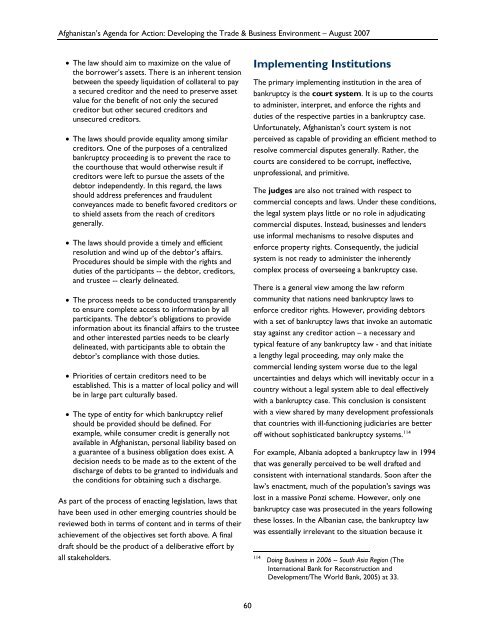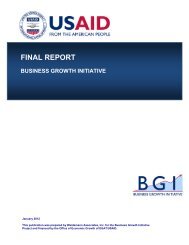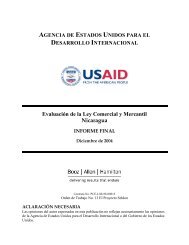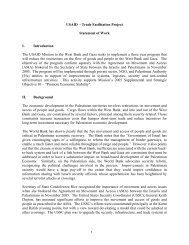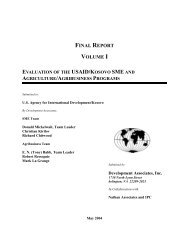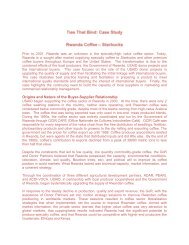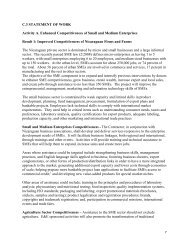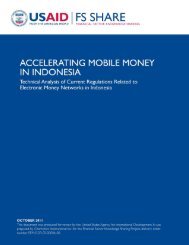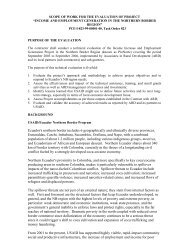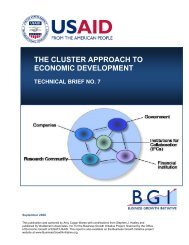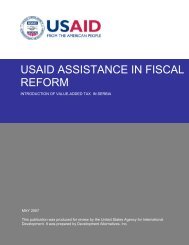Afghanistan's Agenda for Action - Economic Growth - usaid
Afghanistan's Agenda for Action - Economic Growth - usaid
Afghanistan's Agenda for Action - Economic Growth - usaid
Create successful ePaper yourself
Turn your PDF publications into a flip-book with our unique Google optimized e-Paper software.
Afghanistan’s <strong>Agenda</strong> <strong>for</strong> <strong>Action</strong>: Developing the Trade & Business Environment – August 2007• The law should aim to maximize on the value ofthe borrower’s assets. There is an inherent tensionbetween the speedy liquidation of collateral to paya secured creditor and the need to preserve assetvalue <strong>for</strong> the benefit of not only the securedcreditor but other secured creditors andunsecured creditors.• The laws should provide equality among similarcreditors. One of the purposes of a centralizedbankruptcy proceeding is to prevent the race tothe courthouse that would otherwise result ifcreditors were left to pursue the assets of thedebtor independently. In this regard, the lawsshould address preferences and fraudulentconveyances made to benefit favored creditors orto shield assets from the reach of creditorsgenerally.• The laws should provide a timely and efficientresolution and wind up of the debtor’s affairs.Procedures should be simple with the rights andduties of the participants -- the debtor, creditors,and trustee -- clearly delineated.• The process needs to be conducted transparentlyto ensure complete access to in<strong>for</strong>mation by allparticipants. The debtor’s obligations to providein<strong>for</strong>mation about its financial affairs to the trusteeand other interested parties needs to be clearlydelineated, with participants able to obtain thedebtor’s compliance with those duties.• Priorities of certain creditors need to beestablished. This is a matter of local policy and willbe in large part culturally based.• The type of entity <strong>for</strong> which bankruptcy reliefshould be provided should be defined. Forexample, while consumer credit is generally notavailable in Afghanistan, personal liability based ona guarantee of a business obligation does exist. Adecision needs to be made as to the extent of thedischarge of debts to be granted to individuals andthe conditions <strong>for</strong> obtaining such a discharge.As part of the process of enacting legislation, laws thathave been used in other emerging countries should bereviewed both in terms of content and in terms of theirachievement of the objectives set <strong>for</strong>th above. A finaldraft should be the product of a deliberative ef<strong>for</strong>t byall stakeholders.Implementing InstitutionsThe primary implementing institution in the area ofbankruptcy is the court system. It is up to the courtsto administer, interpret, and en<strong>for</strong>ce the rights andduties of the respective parties in a bankruptcy case.Un<strong>for</strong>tunately, Afghanistan’s court system is notperceived as capable of providing an efficient method toresolve commercial disputes generally. Rather, thecourts are considered to be corrupt, ineffective,unprofessional, and primitive.The judges are also not trained with respect tocommercial concepts and laws. Under these conditions,the legal system plays little or no role in adjudicatingcommercial disputes. Instead, businesses and lendersuse in<strong>for</strong>mal mechanisms to resolve disputes anden<strong>for</strong>ce property rights. Consequently, the judicialsystem is not ready to administer the inherentlycomplex process of overseeing a bankruptcy case.There is a general view among the law re<strong>for</strong>mcommunity that nations need bankruptcy laws toen<strong>for</strong>ce creditor rights. However, providing debtorswith a set of bankruptcy laws that invoke an automaticstay against any creditor action – a necessary andtypical feature of any bankruptcy law - and that initiatea lengthy legal proceeding, may only make thecommercial lending system worse due to the legaluncertainties and delays which will inevitably occur in acountry without a legal system able to deal effectivelywith a bankruptcy case. This conclusion is consistentwith a view shared by many development professionalsthat countries with ill-functioning judiciaries are betteroff without sophisticated bankruptcy systems. 114For example, Albania adopted a bankruptcy law in 1994that was generally perceived to be well drafted andconsistent with international standards. Soon after thelaw’s enactment, much of the population's savings waslost in a massive Ponzi scheme. However, only onebankruptcy case was prosecuted in the years followingthese losses. In the Albanian case, the bankruptcy lawwas essentially irrelevant to the situation because it114Doing Business in 2006 -- South Asia Region (TheInternational Bank <strong>for</strong> Reconstruction andDevelopment/The World Bank, 2005) at 33.60


